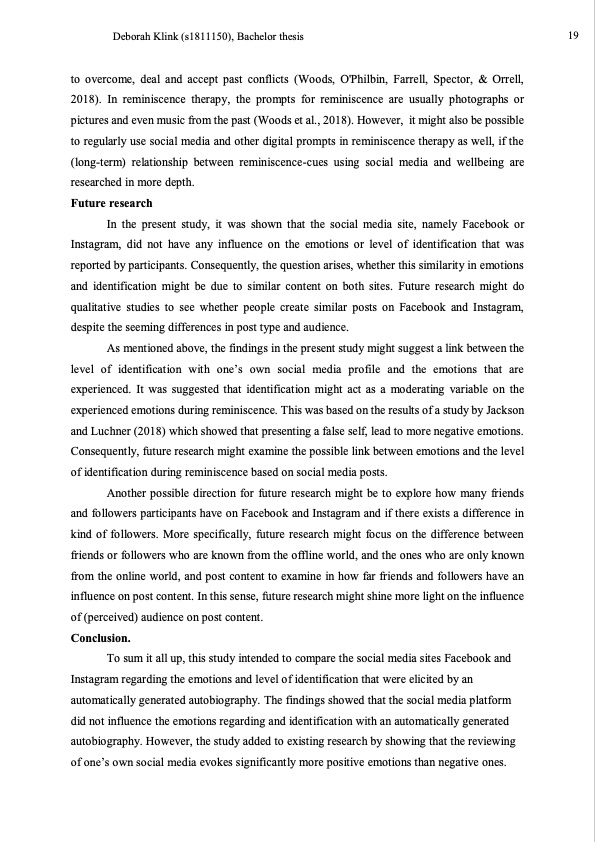
PDF Publication Title:
Text from PDF Page: 020
Deborah Klink (s1811150), Bachelor thesis 19 to overcome, deal and accept past conflicts (Woods, O'Philbin, Farrell, Spector, & Orrell, 2018). In reminiscence therapy, the prompts for reminiscence are usually photographs or pictures and even music from the past (Woods et al., 2018). However, it might also be possible to regularly use social media and other digital prompts in reminiscence therapy as well, if the (long-term) relationship between reminiscence-cues using social media and wellbeing are researched in more depth. Future research In the present study, it was shown that the social media site, namely Facebook or Instagram, did not have any influence on the emotions or level of identification that was reported by participants. Consequently, the question arises, whether this similarity in emotions and identification might be due to similar content on both sites. Future research might do qualitative studies to see whether people create similar posts on Facebook and Instagram, despite the seeming differences in post type and audience. As mentioned above, the findings in the present study might suggest a link between the level of identification with one’s own social media profile and the emotions that are experienced. It was suggested that identification might act as a moderating variable on the experienced emotions during reminiscence. This was based on the results of a study by Jackson and Luchner (2018) which showed that presenting a false self, lead to more negative emotions. Consequently, future research might examine the possible link between emotions and the level of identification during reminiscence based on social media posts. Another possible direction for future research might be to explore how many friends and followers participants have on Facebook and Instagram and if there exists a difference in kind of followers. More specifically, future research might focus on the difference between friends or followers who are known from the offline world, and the ones who are only known from the online world, and post content to examine in how far friends and followers have an influence on post content. In this sense, future research might shine more light on the influence of (perceived) audience on post content. Conclusion. To sum it all up, this study intended to compare the social media sites Facebook and Instagram regarding the emotions and level of identification that were elicited by an automatically generated autobiography. The findings showed that the social media platform did not influence the emotions regarding and identification with an automatically generated autobiography. However, the study added to existing research by showing that the reviewing of one’s own social media evokes significantly more positive emotions than negative ones.PDF Image | Facebook and Instagram emotions identification automatically generated autobiography

PDF Search Title:
Facebook and Instagram emotions identification automatically generated autobiographyOriginal File Name Searched:
thesis-instagram-comparison-instagram-vs-facebook.pdfDIY PDF Search: Google It | Yahoo | Bing
Cruise Ship Reviews | Luxury Resort | Jet | Yacht | and Travel Tech More Info
Cruising Review Topics and Articles More Info
Software based on Filemaker for the travel industry More Info
The Burgenstock Resort: Reviews on CruisingReview website... More Info
Resort Reviews: World Class resorts... More Info
The Riffelalp Resort: Reviews on CruisingReview website... More Info
| CONTACT TEL: 608-238-6001 Email: greg@cruisingreview.com | RSS | AMP |